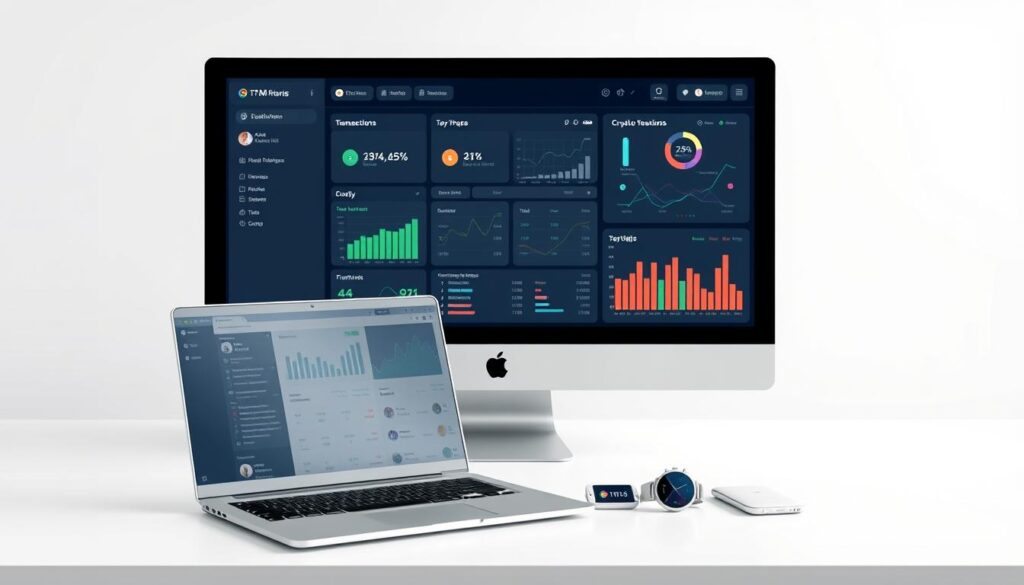Navigating the world of digital asset taxes can feel overwhelming for investors and traders. The sheer volume of transactions across various platforms creates a significant challenge. Traditional manual methods for tracking gains and losses are no longer practical.
Modern portfolios involve complex activities like DeFi staking and NFT trades. Manually calculating obligations for these is time-consuming and prone to human error. This process becomes increasingly difficult as the market evolves.
New technology offers a powerful solution to this problem. Advanced platforms now leverage intelligent systems to handle the heavy lifting. They automatically import data from exchanges and wallets, categorizing transactions with precision.
This comprehensive review will explore leading tax software solutions. We will examine their features, pricing, and integration capabilities. Our goal is to provide clear guidance to help you choose the right tool for your specific needs, ensuring compliance and peace of mind.
Key Takeaways
- Manual tax reporting for digital assets is increasingly difficult and error-prone.
- New software solutions automate the tracking and categorization of transactions.
- These platforms handle complex activities from DeFi to NFTs across multiple exchanges.
- Accurate reporting is crucial with growing regulatory scrutiny and new forms like the 1099-DA.
- This guide will compare top tools to help you find the best fit for your portfolio.
Introduction to AI-Driven Crypto Tax Solutions
Modern investment platforms now leverage advanced technology to simplify what was once a manual and error-prone reporting process. These sophisticated tools have transformed how investors handle their digital asset obligations.
The fundamental technology behind these platforms includes automated data aggregation and intelligent categorization systems. They handle complex scenarios like DeFi protocols and NFT transactions with precision. This represents a significant evolution from basic calculator functionality.
Investors save considerable time by eliminating manual spreadsheet work that could take weeks. The platforms generate tax-ready reports compatible with major filing software. This ensures accuracy and compliance with evolving regulations.
The market adoption reflects this transformation’s success. Leading platforms serve hundreds of thousands of users globally. Some manage portfolios worth billions of dollars, demonstrating widespread trust in these cryptocurrency solutions.
The Importance of Automation in Crypto Tax Calculations
When portfolio activity extends beyond a handful of trades, manual methods for determining tax obligations quickly become unsustainable. Each swap, purchase, or staking reward creates a separate taxable event that requires precise tracking.
The mathematical complexity grows exponentially with multiple exchanges and wallets. Investors managing hundreds of transactions annually face thousands of individual calculations for proper tax reporting.
Automated platforms transform weeks of spreadsheet work into minutes of processing. They connect directly to trading platforms, importing and categorizing data with remarkable efficiency. This represents a significant time savings for active traders.
Manual approaches are prone to errors in cost basis tracking and date recording. Automated systems eliminate these mistakes while handling complex accounting methods like FIFO and LIFO automatically.
With increased regulatory scrutiny and new reporting forms like the 1099-DA, accurate tracking becomes critical. Proper crypto tax compliance protects investors from potential penalties and audits.
AI crypto tax calculation automation: How It Revolutionizes Tax Filing
The annual tax filing process for digital asset investors has undergone a dramatic transformation through intelligent systems. These platforms have turned what was once a dreaded chore into a streamlined operation.
Modern software utilizes pattern recognition to categorize transactions automatically. It connects directly to exchanges via API keys, synchronizing data in real-time. The system identifies different activity types like trades, income, and transfers with precision.
These tools provide remarkable accuracy by cross-referencing transactions across multiple platforms. They handle complex scenarios that would challenge manual methods. Tracking a coin’s journey through various exchanges becomes effortless.
The automation offers peace of mind throughout the year. Investors can focus on their strategy while the software maintains complete records. This eliminates the stressful reconciliation project each filing season.
Key Features of Modern Crypto Tax Software
Contemporary portfolio management tools provide investors with powerful capabilities that go beyond basic transaction recording. These platforms offer comprehensive solutions that handle the complex demands of today’s investment landscape.

Leading platforms support extensive integration with 300 to 800+ exchanges and digital wallets. CoinTracking offers over 300 CSV and API imports, while Crypto Tax Calculator connects with more than 3,500 exchanges and blockchains. This broad compatibility ensures complete data aggregation from all your investment sources.
Real-time portfolio tracking allows users to monitor holdings across multiple wallets and exchanges. The software tracks an impressive 36,000+ coins and assets, including emerging tokens and DeFi projects. Comprehensive analytics provide clear insights into your investment performance and distribution.
Tax reporting capabilities include support for multiple accounting methods like FIFO and LIFO. Platforms have generated over 10 million tax reports with international support for 120+ countries. This ensures compliance with local regulations worldwide.
Data import flexibility includes API connections, CSV uploads, and wallet address tracking. Advanced validation checks detect duplicates and reconcile transfers between wallets. These accuracy features ensure reliable reporting before generating final documents.
Comparative Analysis of Leading Crypto Tax Platforms
The market offers a diverse range of tax platforms, each with distinct pricing structures and integration capabilities. Investors need clear comparisons to select the right solution for their portfolio size and complexity.
Pricing varies significantly across services. Koinly ranges from $49 to $400 per year, while CoinLedger costs between $49 and $299 annually. Crypto Tax Calculator offers plans from $49 to $499 per year. CoinTracking maintains a flat $156 annual fee.
Integration with popular filing software is crucial for seamless tax preparation. Most platforms connect with TurboTax, while many support H&R Block, TaxAct, and TaxSlayer. Some services integrate with 500-800+ exchanges and wallets.
A Trustpilot comparison tool (as of June 2024) helps users evaluate real customer ratings across multiple platforms. Beyond pricing, consider ease of use, customer support quality, and specific feature requirements like DeFi or NFT support.
Free tiers from services like ZenLedger and CoinPanda provide basic functionality but have significant limitations compared to paid plans. Entry-level plans typically support 200-3,500 transactions, while advanced options offer unlimited processing.
Deep Dive into Data Import and Portfolio Tracking
The foundation of accurate digital asset reporting begins with comprehensive data aggregation from all your investment sources. This critical first step ensures your final documents reflect complete financial activity.
Seamless API Integrations and CSV Imports
Modern platforms offer two primary methods for gathering your transaction history. API connections provide real-time synchronization with your exchange accounts. Services like CoinLedger provide detailed instructions for setting up secure API keys.
For users preferring manual control, CSV file imports offer an excellent alternative. You download your transaction history directly from exchanges. Then upload the files to your chosen software for processing.

Tracking Wallets and Exchanges Efficiently
Advanced systems handle wallet tracking through blockchain address monitoring. Simply add your public wallet addresses. The software automatically retrieves all transaction data directly from multiple blockchains.
Platforms support hundreds of exchanges including Binance, Coinbase, and KuCoin. This broad compatibility ensures no transaction goes unrecorded. Your complete portfolio becomes visible in one unified dashboard.
The process typically follows four clear phases: Import, Classify, Review, and Tax Reports. This structured approach guarantees accuracy before generating final documents. Complex activities like DeFi interactions and NFT trades are handled seamlessly.
Understanding Crypto Transactions and Tax Reporting
Many investors face confusion about which cryptocurrency movements create tax obligations. Clear guidelines help determine what requires reporting and what doesn’t. This knowledge prevents errors during tax season.
Any profits from digital asset sales qualify as capital gains. The tax amount depends on the difference between your purchase price and sale price. This principle applies in the United States, Canada, the United Kingdom, and numerous other countries.
Trading one digital currency for another counts as a taxable event. When you exchange Bitcoin for Ethereum, you effectively sell Bitcoin. This transaction creates either a capital gain or loss while establishing a new cost basis for Ethereum.
Modern platforms generate essential documents including Form 8949, Schedule D, and Form 1040. These forms ensure compliance with IRS requirements. The software automatically populates them with your transaction details.
Transferring assets between your own wallets doesn’t trigger reporting obligations. However, sending digital currency to someone else’s wallet does create a taxable event. This distinction is crucial for accurate reporting.
Investors must report both profits and losses from their activities. Reporting losses can reduce your overall tax burden. This strategy, known as tax loss harvesting, offers financial benefits.
With exchanges now issuing 1099-DA forms to users and the IRS, accurate matching becomes critical. Proper documentation ensures your reports align with exchange-provided information. This alignment protects against potential audits.
Enhanced Accuracy with Automated Tax Calculations
The precision of automated digital asset reporting represents a significant advancement over manual methods. Modern platforms incorporate multiple validation layers that catch errors human calculations might miss.

These systems track cost basis across thousands of transactions with remarkable consistency. They apply accounting methods like FIFO and LIFO correctly every time. This ensures proper reporting of your financial results.
Leading platforms feature sophisticated validation processes that identify potential issues. Duplicate transaction detection prevents double-counting of the same activity. Wallet transfer reconciliation ensures movements between your accounts are tracked accurately.
Industry experts consistently praise these accuracy capabilities. Laura Walter, known as The CryptoTaxGirl, states she’s tried over twenty different solutions. She confirms that certain platforms stand out for their attention to detail.
Coin Bureau’s review highlights how one particular service handles complex transactions effortlessly. They note it has more accuracy checks than competing products. This detailed approach gives users greater confidence in their final reports.
| Validation Feature | Manual Method Risk | Automated Solution | Impact on Accuracy |
|---|---|---|---|
| Duplicate Detection | High error probability | Automatic flagging | Eliminates double-counting |
| Cost Basis Tracking | Spreadsheet errors common | Consistent application | Precise gain/loss reporting |
| Transfer Reconciliation | Often missed | Automated matching | Complete transaction history |
| Missing Data Identification | Difficult to spot | System alerts | Comprehensive data inclusion |
Tax expert Ian Corzine recommends consulting a professional before using any software. This ensures the platform is configured correctly for your specific situation. Combining automated tools with expert review creates the most reliable approach.
While these systems greatly enhance reporting precision, professional oversight remains valuable. This combination helps ensure all transactions are properly categorized. The result is confidence in your final submission.
Real-Life Success Stories and User Reviews
Investors share powerful stories about how automated tax solutions changed their approach to financial reporting. These authentic experiences demonstrate the real-world impact of modern platforms.
Bryan’s testimonial from March 2023 captures this transformation perfectly. “CoinLedger is the best. period,” he states. “Before CoinLedger, I was scared to even look at my capital gains, post CoinLedger, I’m excited.” The platform processed his hundreds of transactions and identified necessary adjustments.
Popular content creators confirm these benefits. Lark Davis (TheCryptoLark) notes “CoinTracking is the cheapest available tool out there for you to do your crypto taxes.” This addresses cost concerns many investors share.
Rodrigo Arnedo from Fun on the Ride emphasizes organizational benefits. He calls the platform an essential tool that provides precise transaction records. This improves both tax reporting and investment decision-making.
For users wanting complete hands-off service, platforms offer Full-Service options. The professional team handles the entire import and preparation process. This comprehensive support ensures accuracy while saving valuable time.
These success stories highlight the emotional relief and practical benefits users experience. Beyond tax preparation, the portfolio tracking features provide clear visibility into investment performance throughout the year.
Navigating Complex Crypto Transactions and NFTs
Digital asset portfolios now include sophisticated activities that challenge traditional record-keeping methods. Properly tracking these advanced movements requires specialized solutions.
Managing DeFi, NFTs, and Margin Trades
Modern platforms excel at handling diverse transaction types across multiple blockchains. Users like Bryan report successfully managing “hundreds of Crypto and NFT transactions” through automated systems.
These tools automatically import NFT purchases, sales, and minting activities from various marketplaces. They track assets across Ethereum, Polygon, and other networks seamlessly.

DeFi investors particularly appreciate platforms with extensive decentralized exchange support. The software handles liquidity pool movements and yield farming rewards with precision.
| Transaction Type | Manual Tracking Difficulty | Platform Solution | Supported Platforms |
|---|---|---|---|
| NFT Transactions | High (multiple marketplaces) | Automatic import & categorization | CoinTracking, ZenLedger |
| DeFi Protocols | Very High (smart contracts) | DEX and lending market support | Crypto Tax Calculator, CoinPanda |
| Margin Trading | High (leveraged positions) | Automatic futures tracking | CoinTracking, Awaken |
| Staking Rewards | Medium (income categorization) | Income tracking & cost basis | Awaken, CoinPanda |
Overcoming Complex Transaction Challenges
Specialized platforms address the most challenging aspects of digital asset reporting. They ensure no taxable events are missed during portfolio analysis.
Services like ZenLedger and CoinPanda handle the full spectrum of DeFi and NFT activities. Their robust tracking capabilities provide confidence during tax season.
Investors benefit from comprehensive support for governance tokens and protocol transfers. This complete coverage transforms complex portfolio management into a streamlined process.
Integrating Tax Software with TurboTax and Other Platforms
The final step in digital asset reporting involves seamlessly connecting specialized platforms with mainstream tax preparation services. This integration eliminates manual data entry and ensures accurate transfer of your financial information.
Leading solutions offer direct import functionality to popular filing software. CoinLedger notes “Direct import to Turbotax, making finalizing your total taxes very easy.” This feature saves significant time during tax season.
TurboTax Integration Benefits
All major digital asset platforms support TurboTax integration. This compatibility simplifies the process for individual users and accounting professionals alike. The connection creates a smooth workflow from transaction tracking to final submission.
Platforms generate essential documents including Form 8949 and Schedule D within their systems. Users can then import these forms directly into their preferred tax preparation software. This eliminates the risk of manual entry errors.
| Platform | TurboTax Support | Additional Integrations | Special Features |
|---|---|---|---|
| Koinly | Yes | H&R Block, TaxAct | Comprehensive reporting |
| CoinLedger | Yes | TaxAct, TaxSlayer, H&R Block | Direct import functionality |
| Crypto Tax Calculator | Yes | TaxAct, MyTax | International support |
| CoinTracker | Yes | H&R Block | Official TurboTax partner |
CoinTracker serves as the official tax partner for both Coinbase and TurboTax. This partnership provides additional credibility and seamless integration for users of these popular services. The platform allows users to “download tax reports swiftly and file them through TurboTax or their preferred accountants.”
Accounting professionals benefit greatly from these integration capabilities. Clients can export complete tax documents for professional review. This streamlined approach makes serving clients with digital asset holdings more efficient.
Beyond TurboTax, most platforms support additional filing options including H&R Block and TaxAct. This flexibility ensures users can work with their preferred tax preparation software while maintaining accurate digital asset reporting.
Security and Data Validation in Crypto Tax Tools
The integrity of financial documentation depends heavily on robust security protocols and thorough validation processes within portfolio management systems. Investors need confidence that their sensitive information remains protected while generating accurate reports.
Data Protection and Accuracy Checks
Leading platforms implement multiple layers of security to safeguard user information. They use advanced encryption for stored data and secure API connections with read-only permissions.
Compliance with privacy regulations across 120+ countries ensures proper handling of personal information. This global approach provides consistent protection standards regardless of user location.
Validation processes include duplicate transaction detection and wallet transfer reconciliation. Systems also identify missing cost basis information and verify date consistency across all records.
Coin Bureau’s analysis highlights that certain platforms stand out for their attention to detail. Their review notes comprehensive accuracy checks that exceed competitor offerings.
| Security Feature | Protection Level | User Benefit |
|---|---|---|
| Data Encryption | Bank-grade security | Sensitive information protection |
| Read-Only API Access | No trading permissions | Account safety assurance |
| International Compliance | 120+ countries supported | Global regulation adherence |
| Validation Checks | Multi-layer verification | Reporting accuracy confidence |
Full-service options provide human expert oversight for maximum confidence. Teams handle data import and ensure accuracy through comprehensive validation processes.
Customized services adapt to individual portfolio complexities. This personalized approach addresses unique needs while maintaining strict security standards.
Customer Support and Expert Guidance
Beyond technical features, comprehensive support services provide the safety net investors need for confident tax preparation. Leading platforms offer multiple assistance levels to match different user needs.
Accessing Full-Service Support
For users preferring hands-off assistance, full-service options deliver complete handling by expert teams. CoinTracking’s dedicated team manages data import and validation processes.
This service proves invaluable for tax professionals expanding into digital assets. The platform notes it’s “dedicated for tax professionals who are not proficient in cryptocurrency taxes but would like to add them to their service portfolio.”
| Support Tier | Best For | Response Time |
|---|---|---|
| Self-Service Documentation | Basic questions | Immediate access |
| Email Support | Standard inquiries | 24-48 hours |
| Live Chat Assistance | Urgent issues | Under 30 minutes |
| Full-Service Handling | Complete delegation | Team-managed |
Expert Advice for Seamless Tax Filing
Tax professional Ian Corzine provides foundational guidance: “Before getting software, consult a tax accountant.” This ensures proper setup for your specific situation.
Platforms supporting 120+ countries maintain teams knowledgeable about diverse regulations. Kirk Phillips CPA endorses CoinTracking as “a comprehensive feature-rich finance, tax, accounting, and strategic planning crypto dashboard.”
With experience since 2012 serving millions globally, these platforms have refined their support resources. This expertise helps users navigate complex reporting requirements across different countries.
Pricing, Subscription Plans, and Value Comparison
Investment platforms offer diverse pricing models based on transaction volume and feature sets. Understanding these costs helps investors select the right solution for their portfolio size.
Entry-level plans typically cost $0-$49 per year. These options support 200-3,500 transactions annually. Free tiers from services like ZenLedger and CoinPanda provide basic functionality.
Mid-range subscriptions range from $49-$199 per year. They handle up to 20,000 transactions with enhanced features. These plans suit most active traders.
Premium options reach $400-$999 per year for unlimited processing. They include priority support and advanced optimization tools. Professional traders benefit from these comprehensive packages.
| Platform | Entry Plan | Mid-Tier | Premium Plan |
|---|---|---|---|
| Koinly | $49/year | $99/year | $400/year |
| CoinLedger | $49/year | $99/year | $299/year |
| Crypto Tax Calculator | $49/year | $99/year | $499/year |
| CoinTracking | Free | $159/year | $839/year |
CoinTracking demonstrates typical tiered pricing. Their Free plan supports 200 transactions. The Pro tier costs $159 per year for 3,500 transactions.
Higher-priced subscriptions offer significant value-added features. These include multiple accounting method simulations and unlimited historical reports. Business clients gain access to corporate-specific functionality.
Crypto Tax Calculator provides a 30-day money-back guarantee. This extended trial period reduces risk for new users. It exceeds the standard 14-day offers from competitors.
Spending $49-$299 annually can save dozens of manual work hours. Accurate reporting also helps avoid potential penalties. This represents strong value for most investors.
Tips for Getting Started with Crypto Tax Automation
Beginning your journey with digital asset reporting tools requires understanding the initial setup process. The first step involves creating an account on your chosen platform. Select a subscription plan that matches your transaction volume for the year.
Configure your basic settings, including your tax jurisdiction and preferred accounting method. Setting your base currency ensures all values are calculated correctly. This foundation makes the subsequent steps much smoother.
Setting Up API Keys and Importing Data
Platforms like CoinLedger provide clear guides for connecting your exchange accounts. They show you how to set up API keys for every single exchange. This method automatically pulls your transaction history.
If you prefer not to use direct connections, the CSV import method is a solid alternative. Download your history as Excel sheets from each platform. Then, upload these files to your account to import data manually.
The workflow typically follows four clear phases. The Import phase gathers all your data from wallets and exchanges. Next, the Classify phase reviews and categorizes each transaction type.
Best Practices for Initial Account Configuration
Start by importing data from your largest exchange first. This gives you a substantial base to work with. Carefully review the initial transaction classifications for accuracy.
Be sure to add all your wallet addresses to capture a complete history. Expert advice strongly emphasizes consulting a tax professional before finalizing your setup. This ensures your configuration is optimal for your situation.
For users with only a few trades, consider trying a free calculator first. These are available for several countries. Generate a test report to verify everything looks correct before the final submission.
Conclusion
The evolution of financial technology has brought unprecedented clarity to what was once a murky compliance landscape. Modern platforms transform complex reporting into a streamlined process that saves investors significant time and effort.
Leading solutions like Koinly, CoinLedger, and Crypto Tax Calculator each offer unique strengths for different portfolio needs. Their comprehensive tracking capabilities handle thousands of transactions across multiple exchanges with remarkable accuracy.
Professional guidance remains essential for optimal setup and compliance. Consulting with tax experts ensures your crypto taxes are calculated correctly according to current regulations.
For those with specific concerns, review the frequently asked questions covered throughout this guide. These address common issues investors face when managing their cryptocurrency taxes.
Take advantage of free trials to find the platform that best matches your transaction volume and budget. With the right tools, you can confidently manage your crypto taxes throughout the year and file with complete peace of mind.
FAQ
What types of transactions can your software handle?
Our platform supports a wide range of activities, including trading, staking, DeFi protocols, and NFT purchases. It automatically categorizes these for accurate gain and loss reporting across multiple blockchains.
Which exchanges and wallets are supported for data import?
We offer seamless integration with hundreds of major platforms like Coinbase, Binance, and Kraken via API. You can also import data from any wallet or exchange using CSV files for comprehensive portfolio tracking.
How does the software calculate my capital gains?
The system uses accepted accounting methods, such as FIFO, to determine your cost basis. It then calculates your gains or losses for each transaction, providing a clear summary for your tax forms.
Can I generate the necessary forms for my tax return?
Yes. The service produces ready-to-file forms like IRS Form 8949 and Schedule D. These documents detail your annual cryptocurrency activity and are designed for easy use with tax filing platforms.
What if I have questions or need help with my report?
Our team provides full-service support. You can access expert guidance to ensure your filing is accurate and addresses any complex transaction challenges you may face.
Is my financial data secure with your service?
A> Absolutely. We employ bank-level security measures to protect your information. All data is encrypted, and we perform validation checks to maintain the highest accuracy and privacy standards.
Do you support users outside the United States?
Our tools are designed for a global audience, with support for tax reporting rules in many countries. Please check our website for a specific list of supported regions and their respective tax forms.


No comments yet